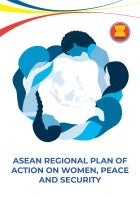Date:
The summary report outlines findings from the baseline study conducted to implement the Strategic Note 2023–2027, which guides the UN Women's work in Nepal. Divided into four outcomes, the report examines the current state of women's rights and gender equality
Date:
Heading into 2025, we are about to commemorate the thirtieth anniversary of the Beijing Declaration and Platform for Action (Beijing+30). Adopted by 189 countries at the Fourth World Conference on Women in 1995, it is one of the most comprehensive blueprints for gender equality and women’s empowerment ever created.
Date:
This is a crucial document that represents a collective voice, uniting women from different backgrounds and generations.
Date:
As one of the champion countries on Women, Peace and Security (WPS), the Philippines has integrated the WPS agenda in several national and subnational policy instruments responding to existing and emerging security challenges, such as armed conflict, terrorism, the illicit drug trade, human trafficking, climate change, cybersecurity and pandemics. Among these policy instruments, the government has adopted four iterations of a National Action Plan (NAP) on WPS (see below), including its inaugural NAP-WPS (2010-2016) in 2010, making it the first country in Asia to achieve this. The NAP-WPS has been localized in the Bangsamoro Autonomous Region in Muslim Mindanao (BARMM) through the BARMM Regional Action Plan (RAP) on WPS, which has gone through three iterations, including the third-generation BARMM RAPWPS 2023-2028 adopted in October 2023.
Date:
The ‘Gender Strategy of the National Police of Timor-Leste (2024-2028)’ was jointly developed by the National Police of Timor-Leste, with technical support from UN Women and generous support from the Government of the United Kingdom, the Government of Canada and the Government of the Republic of Korea under the UN Women ASEAN programme Empowering Women for Sustainable Peace: Preventing Violence and Promoting Social Cohesion.
Date:
The semi-annual UN Women Bangladesh Newsletter: January-June 2024 reflects on the key highlights and major updates of UN Women Bangladesh’s interventions to advance gender equality and women empowerment in the country.
Date:
UN Women is closely examining the opportunities and challenges for lesbian, gay, bisexual, transgender, gender diverse, intersex, and queer (LGBTIQ+) persons’ full equality and inclusion in electoral processes in 2024 and beyond.
Date:
This submission on electoral participation and sexual orientation and gender identity closely examines the opportunities and challenges for lesbian, gay, bisexual, transgender, gender diverse, intersex, and queer (LGBTIQ+) persons’ full equality and inclusion in electoral processes.
Date:
This Brief provides a comprehensive situation analysis of gender equality in Bangladesh, offering a snapshot of the nation's advancements in key areas including governance; women, peace, and security; ending violence against women; economic empowerment; climate change and disaster risk reduction, and humanitarian response.
Date:
The Gender Budget Statement is an important tool of Gender Responsive Budgeting. A budget document published annually by the Government of India, it presents budget allocations and public expenditure for gender equality and women’s empowerment.
Date:
A detailed document on all 'frequently asked questions' about Gender Responsive Budgeting in FAQ format.
Date:
A detailed documentation of 10 Indian states on their Gender Responsive Budgeting journeys, namely.
Date:
The semi-annual UN Women Bangladesh Newsletter: July-December 2023 reflects on the key highlights and major updates of UN Women Bangladesh’s interventions to advance gender equality and women empowerment in the country.
Date:
This localization toolkit and guidelines provide technical guidance on “how” to facilitate the implementation of the Regional Plan of Action by adapting its key provisions to national contexts.
Date:
The Strategic Note (SN) articulates the multi-year strategy, rationale, envisioned results, targets, and resource requirements for UN Women Viet Nam. In essence, the SN provides a roadmap for improving the lives of women and girls in the context where UN Women operates.
Date:
Significant progress has been made in the second year of implementation (January to December 2022) of the project, with all annual targets achieved and 43 percent of immediate outcomes and output-level project targets already reached or surpassed, while the remaining targets are on track. The highlights of the progress and results attained by outcomes are featured in this document
Date:
The brief further highlights the progress and achievements resulting from UN Women interventions implemented between 2020 and 2022.
Date:
The brief has been developed under the ‘Enhancing Access to Justice for Women in Asia and the Pacific’ Regional Programme, jointly implemented by UN Women, the Office of the United Nations High Commissioner for Human Rights (OHCHR) and the International Commission of Jurists, with generous support from the Government of Sweden.
Date:
Implementing the Women, Peace and Security (WPS) agenda has long been recognised as essential to achieving sustainable peace and prosperity in the ASEAN region. ASEAN member states remain committed to gender equality and the full protection of women’s rights. They also remain steadfast in their aim to maintain regional peace, address shared security concerns and advance development and prosperity for all citizens. Member states consider the development of this Regional Plan of Action on Women, Peace and Security (RPA WPS) as a critical step to making progress on these commitments. The RPA WPS aims to mobilise the whole of ASEAN to advance implementation of the WPS agenda to promote sustainable peace and security for all citizens.
Date:
UN Women's Office in India, based in New Delhi, works with the Government of India, other UN agencies, civil society, the private sector and influencers to achieve India's strategic priorities for women's advancement. Our programmes focus on upholding women's human rights and providing opportunities for women and girls to live up to their full potential.

![[cover]](/sites/default/files/styles/search_image_140px/public/2025-04/np-20250385755-baseline-study-report-07042025-website-960px.jpg?itok=VxHBLOYs)
![[cover]](/sites/default/files/styles/search_image_140px/public/2025-03/cn-c1515-en_unwomenchina-newsletter2024-960px.jpg?itok=5te-4pFb)
![[cover]](/sites/default/files/styles/search_image_140px/public/2025-02/bd-c1460-charter-of-demands_eng_960px.jpg?itok=Lx9iXXPQ)

![[cover]](/sites/default/files/styles/search_image_140px/public/2024-11/gender_strategy_english_draft-960px.jpg?itok=LQ1B-nZ3)
![[cover]](/sites/default/files/styles/search_image_140px/public/2024-07/bd-c1022-unwomen-newsletter_jan-june2024-960px.jpg?itok=MYFpJPPV)

![[cover]](/sites/default/files/styles/search_image_140px/public/2024-04/bd-c836-gender-equality-brief_bangladesh_2024-960px.jpg?itok=vYgIqoCz)
![[cover]](/sites/default/files/styles/search_image_140px/public/2024-02/in-c640-annex-42-gbs-formats-in-india-cover-960px.jpg?itok=Moy_yDoM)
![[cover]](/sites/default/files/styles/search_image_140px/public/2024-02/in-c638-annex39-faq-on-gender-budgeting-english-960px.jpg?itok=M2sREIHG)
![[cover]](/sites/default/files/styles/search_image_140px/public/2024-02/in-c639-annex-40-state-grb-journeys-compendium-960px.jpg?itok=lXgfOn_e)
![[cover]](/sites/default/files/styles/search_image_140px/public/2024-02/bd-c620-un-women_newsletter_july-_december-2023-960px.jpg?itok=6W4ejcK8)

![[cover]](/sites/default/files/styles/search_image_140px/public/2023-10/vn-sn_brochure_vietnam-960px.jpg?itok=GuQg_lgK)

![[cover]](/sites/default/files/styles/search_image_140px/public/2023-06/bd-IN-BRIEF_GOVERNANCE-AND-PARTICIPATION-OF-WOMEN-IN-PUBLIC-LIFE-960px.jpg?itok=E8baEtob)
![[cover]](/sites/default/files/styles/search_image_140px/public/2023-05/ap-GPS-CBM-960px.jpg?itok=RPtmznIP)

![[cover]](/sites/default/files/styles/search_image_140px/public/2023-01/in-UN%20WOMEN-OVERALL-BROCHURE-251022-960px.jpg?itok=5rGc5yqT)